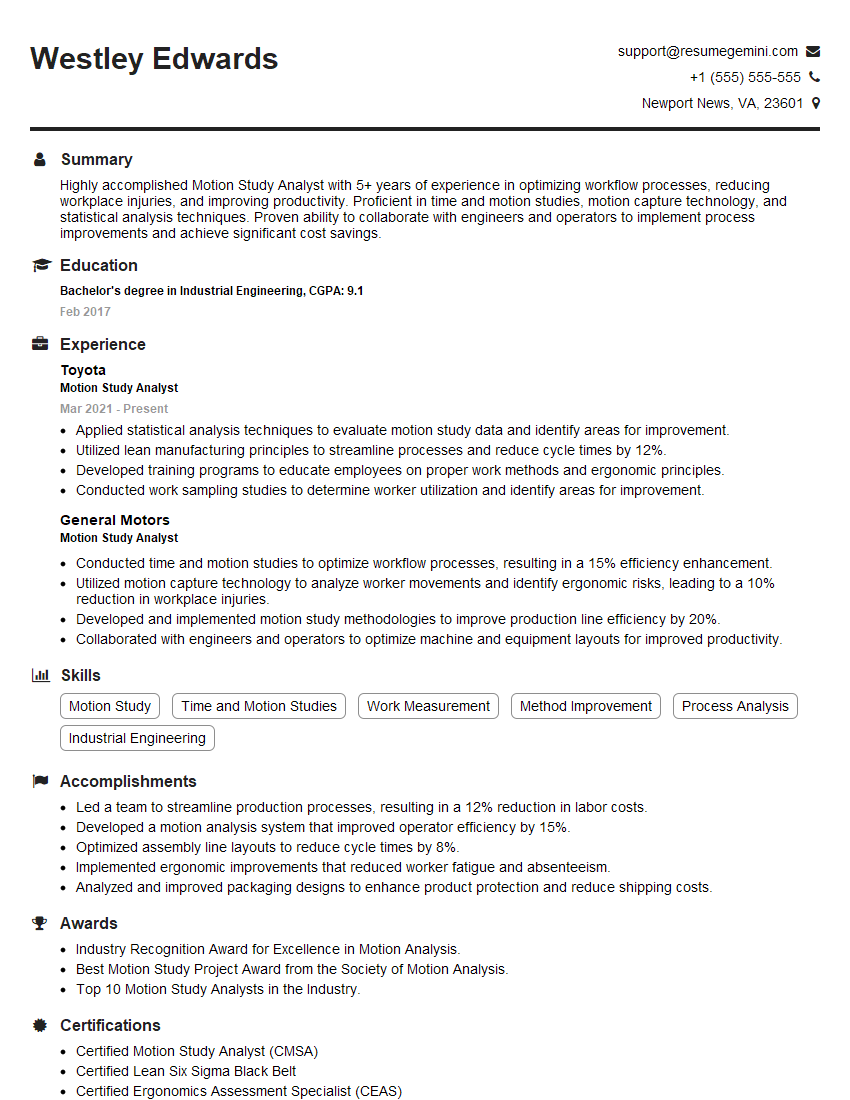Feeling lost in a sea of interview questions? Landed that dream interview for Motion Study Analyst but worried you might not have the answers? You’re not alone! This blog is your guide for interview success. We’ll break down the most common Motion Study Analyst interview questions, providing insightful answers and tips to leave a lasting impression. Plus, we’ll delve into the key responsibilities of this exciting role, so you can walk into your interview feeling confident and prepared.
Acing the interview is crucial, but landing one requires a compelling resume that gets you noticed. Crafting a professional document that highlights your skills and experience is the first step toward interview success. ResumeGemini can help you build a standout resume that gets you called in for that dream job.
Essential Interview Questions For Motion Study Analyst
1. What are the different types of motion study?
- Micromotion study
- Macromotion study
- Memomotion study
- Chronocyclegraph study
2. What are the principles of motion economy?
- Use both hands
- Move the hands in opposite and symmetrical directions
- Use foot pedals instead of hand controls
- Avoid twisting motions
- Avoid stooping or reaching
3. What are the steps involved in a motion study?
- Select the operation to be studied
- Record the current method
- Analyze the current method
- Develop an improved method
- Implement the improved method
- Follow up on the improved method
4. What are some of the benefits of motion study?
- Increased productivity
- Reduced costs
- Improved quality
- Reduced fatigue
- Improved safety
5. What are some of the challenges of motion study?
- Overcoming resistance to change
- Ensuring that the improved method is actually implemented
- Measuring the benefits of motion study
6. What are some of the latest trends in motion study?
- The use of video cameras to record motion
- The use of computer software to analyze motion
- The use of motion capture systems to track motion in 3D
7. What are the different types of motion study equipment?
- Stopwatches
- Cycle timers
- Video cameras
- Computer software
- Motion capture systems
8. What are the different types of motion study charts?
- Flow charts
- Man-machine charts
- Operation charts
- Therbligs charts
- Simo charts
9. What are the different types of motion study models?
- Physical models
- Computer models
- Mathematical models
10. What are the different types of motion study reports?
- Motion study reports
- Time study reports
- Method study reports
- Feasibility study reports
Interviewers often ask about specific skills and experiences. With ResumeGemini‘s customizable templates, you can tailor your resume to showcase the skills most relevant to the position, making a powerful first impression. Also check out Resume Template specially tailored for Motion Study Analyst.
Career Expert Tips:
- Ace those interviews! Prepare effectively by reviewing the Top 50 Most Common Interview Questions on ResumeGemini.
- Navigate your job search with confidence! Explore a wide range of Career Tips on ResumeGemini. Learn about common challenges and recommendations to overcome them.
- Craft the perfect resume! Master the Art of Resume Writing with ResumeGemini’s guide. Showcase your unique qualifications and achievements effectively.
- Great Savings With New Year Deals and Discounts! In 2025, boost your job search and build your dream resume with ResumeGemini’s ATS optimized templates.
Researching the company and tailoring your answers is essential. Once you have a clear understanding of the Motion Study Analyst‘s requirements, you can use ResumeGemini to adjust your resume to perfectly match the job description.
Key Job Responsibilities
Motion Study Analysts play a critical role in optimizing industrial processes. Their key responsibilities include:
1. Data Collection and Analysis
Conduct detailed motion studies to capture and analyze data on human movements, process flow, and equipment usage.
2. Process Optimization
Develop and implement strategies to improve efficiency and productivity by eliminating waste, reducing cycle time, and streamlining operations.
3. Motion Measurement and Simulation
Use advanced tools and techniques to measure and simulate human movements, identifying areas for improvement and increasing safety.
4. Training and Education
Train employees on motion study principles and techniques, empowering them to contribute to process optimization initiatives.
5. Ergonomic Assessment
Assess work environments and provide recommendations to enhance ergonomics, preventing injuries and promoting employee well-being.
Interview Tips
To ace your Motion Study Analyst interview, here are some tips:
1. Research the Company and Role
Thoroughly research the company’s industry, products/services, and specific requirements of the Motion Study Analyst role.
2. Highlight Your Abilities
Emphasize your technical skills in motion analysis, data collection, and process optimization. Showcase your proficiency in using relevant software tools.
3. Prepare Example-Based Answers
Use the STAR Method (Situation, Task, Action, Result) to provide specific examples of how you have successfully conducted motion studies and improved processes.
4. Demonstrate Your Problem-Solving Skills
Discuss how you approach complex problems, gather data, and develop innovative solutions to optimize processes and increase efficiency.
5. Quantify Your Impact
Whenever possible, quantify the results of your motion studies, highlighting the specific improvements in productivity, waste reduction, or cycle time reduction.
Next Step:
Armed with this knowledge, you’re now well-equipped to tackle the Motion Study Analyst interview with confidence. Remember, preparation is key. So, start crafting your resume, highlighting your relevant skills and experiences. Don’t be afraid to tailor your application to each specific job posting. With the right approach and a bit of practice, you’ll be well on your way to landing your dream job. Build your resume now from scratch or optimize your existing resume with ResumeGemini. Wish you luck in your career journey!
